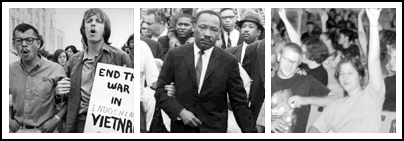-
Black Music Month 2012 - Part IV: "Lose Some Wait"
June 19, 2012
Have an opinion? Add your comment below. During this period, programming had reached a point where the pressure had come from a lot of community-based groups to find and train some African-Americans to be put in charge of the growing number of Urban stations that were springing up all over the country. Naturally, the first ones to be recruited were usually the announcers who had tenure in major markets.
-
It is hard to realize that a quarter of a century ago, many of today’s baby boomers were committed to the civil rights movement, the revolt of youth, the anti-war movement and other causes. Descendants of a generation dedicated to saving the world and believing that they could succeed by influencing the government are suddenly concerned with just keeping their jobs and businesses afloat so they can sustain life for themselves and their families.

With the snap of a finger, an era that mixed glory and hope, anger and frustration, liberalism, radicalism and conservatism has become history. Even though we may have reached some milestones, 2012 is a time when our industry, our economy and our nation are severely challenged.
And so it is as we ease into the final segment of our current series for Black Music Month 2012, we pause for a brief look at the current state of the music and radio industries. What may have begun as a voice of advocacy is now also a tool of empowerment. We're going to include Black radio this time because it still contributes to and determines so much of the success of our music. If great songs and artists never got on the radio, never had hits, never toured, even in this economy, our world wouldn't be the same. Those of us in Urban radio still hold the future of the format and Black music in our hands.
The line moves, the bar shifts – the standards are as difficult to grasp as a fistful of sand. So what’s next? The one thing we have to do is “lose some wait.” That means pushing procrastination aside, quit wasting time and move forward. There are new lessons to be learned and some lessons we already know just need to be re-applied. For example, we know that the reason that some of the early black-owned stations failed. They failed primarily because the owners didn’t understand the uniquenesses of the radio business. They failed because the audience wasn’t going to listen just because the station was Black-owned. When we further examine the reasons for the failures, we find that like other businesses built on bloodline alone, they were doomed to fail. Successful family businesses, including radio stations, have to be flexible, innovative and solution-oriented. Because today's competitive environment is so tense, to stay in business, parents are looking for their adult children to come into the family business and bring their corporate expertise with them. At the same time, many children are finding that job security no longer exists and that they're more likely to achieve their potential in the family business than in corporate America.
Early Ebony Programmers & Research
As Black radio discovered the benefits of research, things begin to change on the dark side of the dial. Early music research told us for example, that a song with 20% burn just means that 80% of the audience isn't burned on it. If it's an artist that was valuable enough to play often and early and take a vested interest in breaking, why in the world would you want to walk away from the artist and let another format just have them?

Despite the fact that the economy has forced many stations to cut back or eliminate it completely, research is still important. Properly done and interpreted, research allows you to make informed decisions about the music and other programming. It wasn't as though no real programming was going down in Black radio before the end of the '80s and '90s. It was just that there wasn't much real science and research being applied, even among major-market stations.
Despite the fact that the economy has forced many stations to cut back or eliminate it completely, research is still important. Urban programmers up until the mid-'70s, regardless of what title they held, were usually just "chief announcers." They put up announcer schedules and worked with the public service and news directors to make certain shifts were covered. They did not offer advice to air talent. They didn't recruit, set salary plateaus or plan contests and promotions. And I can tell you firsthand, even in the major markets, we were not given a programming budget.
Many who had the title simply didn't function as program directors. The reasons were many and varied. The primary reason was the owners and managers knew they had not been trained and they lacked the experience that would allow them to program with confidence. Most owners and managers didn't want to risk their stations to these untrained programmers.
During this period, programming had reached a point where the pressure had come from a lot of community-based groups to find and train some African-Americans to be put in charge of the growing number of Urban stations that were springing up all over the country. Naturally, the first ones to be recruited were usually the announcers who had tenure in major markets.
The problem was that not every great air personality makes a great programmer. Some of these guys had little or no knowledge of ratings, research or recruiting. But eventually some companies began training their chief announcers to become radio executives. The next step, of course, was to put some Black GMs in place. This task was somewhat easier because there were some Black salesmen and sales managers who could make the transition to the top management level.
Programming had become somewhat of an art form for other formats. No longer were DJs given the freedom to program their own shows. Gone were the theme songs and the creative freedom to include comments in between the songs they played. So was the clutter. Clutter was extraneous talk, long promotional announcements, and even scheduled newscasts outside of mornings. News, with the advent of deregulation, was limited to just the hours between 6 and 10 am Monday through Friday. The result was that Black radio became much more controlled, lean and mean. A lot of jobs and people were eliminated in the process.
But progress was made. Those who were programming Urban stations figured out how to cut the current playlist down to about 40-45 titles. They made certain that the oldies that were played were former top hits and even learned to blend songs so that the smoothest possible transition occurred between songs.
In the early 1970s the composite hour theory was born. That theory said that every hour was like every other hour. The little shows done by each of the individual DJs were less than the big show, which was the whole of the broadcast week. The training was begun by the white PDs and finished by the Black PDs who eventually replaced them. Air talent were brought in, usually after their shows, and forced to listen along with the program director to their tapes. Areas that needed improvement were pointed out to them.
The result was that eventually, Black programmers emerged who knew how to set up a station to win. They learned how to construct contests and how to make certain that there were no repeat winners. Research was used to determine what the most-wanted prizes were. On the music side, records were rotated throughout the broadcast day so that overplay and underplay of songs was carefully controlled and the audience found they could listen longer.
All these practices made Black programming more competitive. In markets, such as Houston, Atlanta, Memphis, Birmingham, New Orleans, Miami and Baltimore, Black radio stations moved to the dominant position in the market.

We have now reached the halfway point in 2012. We've arrived at a point where we realize that many things are still the same. The world goes on punishing people for skin color. It is part of a culture that creates the evaluative frame that gives meaning to individual lives. For nearly 400 years Americans identified as Black have been affected by those who use the cage of color to deny and affirm, to elaborate one culture, to refuse another.
What has happened is a ripple effect that has caused a loss of jobs. There have been a number of qualified people who have been forced out, many with no place to go. In radio, they've been replaced by board operators.
Consumer Spending & Marketing
We live in a time when Americans all across this remarkable land awakened to a sense that something was drastically wrong, that our history burdened us with failures and responsibilities, that we might hold in our hands the power to change what it was that worried us. Despite the challenges, what is also emerging in 2012 are statistics that show the tremendous buying power that once existed has gradually slipped. That once-$300 billion consumer market created by African-Americans is now off as much as 30% even though the total Black population has increased at twice the rate of the majority population in the last decade. Projections for population growth by the end of this decade show increases to at least 35 million consumers. Spendable income needs to grow at the same pace to approach the $300 billion formerly available to advertisers, including record and CD purchasers.
The size of the African-American population coupled with the propensity of blacks to spend a disproportionate share of their disposable income on music, continue to make marketing to them important, even in a shrinking economy.
In 2012, an endless recombinant and fundamentally social process generates countless hours of creative product. To say that this poses a threat to the music industry is simply untrue. But the music industry, though it may not know it yet, needs to be careful that it doesn't end up going the way of the vinyl record.
We need to lose some wait, legislate after the fact; We’re caught up in a perpetual game of catch-up while new technologies re-define us, as surely and perhaps as often as we've been re-defined.
And so we continue to ask the question "can we lose some wait?" Can we reduce how long it takes to make a decision and quit wasting time? We have attempted to define and redefine this series on Black Music 2012 with some of the answers to those questions. Black music month like Black history month is still a past to be celebrated. It’s also a vibrant story to be continued from generation to generation. We hope we were able to share some stories and develop some new interest in our music. We also hope that you were able to enjoy the humor, the history and the candor. Â And finally, we hope that you understand that the real fitness goal of “wait loss” is not only less, but better. Word.
-
-
